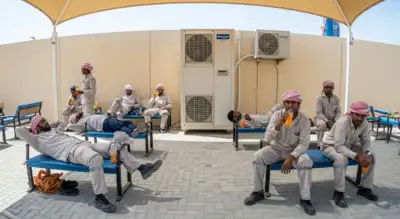The UAE’s three-month midday work ban, also known as the Occupational Heat Stress Prevention Policy, officially concluded today (September 15) with a remarkable 99 per cent compliance rate across government and private companies, according to the Ministry of Human Resources and Emiratisation (MoHRE).
The policy, now in its 21st year, prohibits outdoor work under direct sunlight from 12:30 pm to 3:00 pm daily between June 15 and September 15, coinciding with the country’s peak summer heat.
The initiative is widely regarded as a cornerstone of the UAE’s labour protection policies. It not only limits outdoor work during the hottest hours of the day but also mandates that companies provide shaded rest areas, adequate cooling facilities, sufficient drinking water, hydration supplements such as electrolytes, and first aid equipment at worksites.
“This policy has become an established practice and priority among companies operating in the UAE,” said Mohsin Ali Al Nassi, Assistant Undersecretary for Inspection and Compliance at MoHRE. “It reflects the country’s humanitarian commitment to protecting workers by adhering to the highest occupational health and safety standards.”
This year’s campaign included inspections at thousands of work and construction sites to ensure compliance, with results showing near-total adherence. Authorities credited both enforcement and widespread corporate buy-in as drivers of success.
To further support the initiative, more than 10,000 air-conditioned rest stations were provided for delivery workers across the country. These stations were equipped with seating, water dispensers, and other amenities to help workers cope with the summer heat.
Additionally, companies and community organisations launched complementary initiatives such as distributing refreshments, meals, and hydration packs.
Health and safety checks also played a crucial role. Mobile medical teams were dispatched across several sites to provide workers with free medical examinations, reinforcing preventive healthcare measures.
MoHRE emphasised that the midday break is part of a broader ecosystem of labour protection policies aimed at ensuring safe and humane working conditions. The ministry reiterated its commitment to regularly updating occupational health and safety requirements in line with international best practices.
Workers and advocacy groups welcomed the results, noting that such measures are critical in preventing heat-related illnesses and accidents. Heat stress, if unmanaged, can cause serious health issues such as dehydration, heat stroke, and even fatalities, making such preventive policies vital in high-temperature climates like the UAE.
By concluding another successful year of the midday break with near-universal compliance, the UAE continues to set an example in the region for integrating labour welfare into its development strategies. The ministry said it remains committed to strengthening the policy further in future summers, ensuring that worker health remains at the forefront of national priorities.

